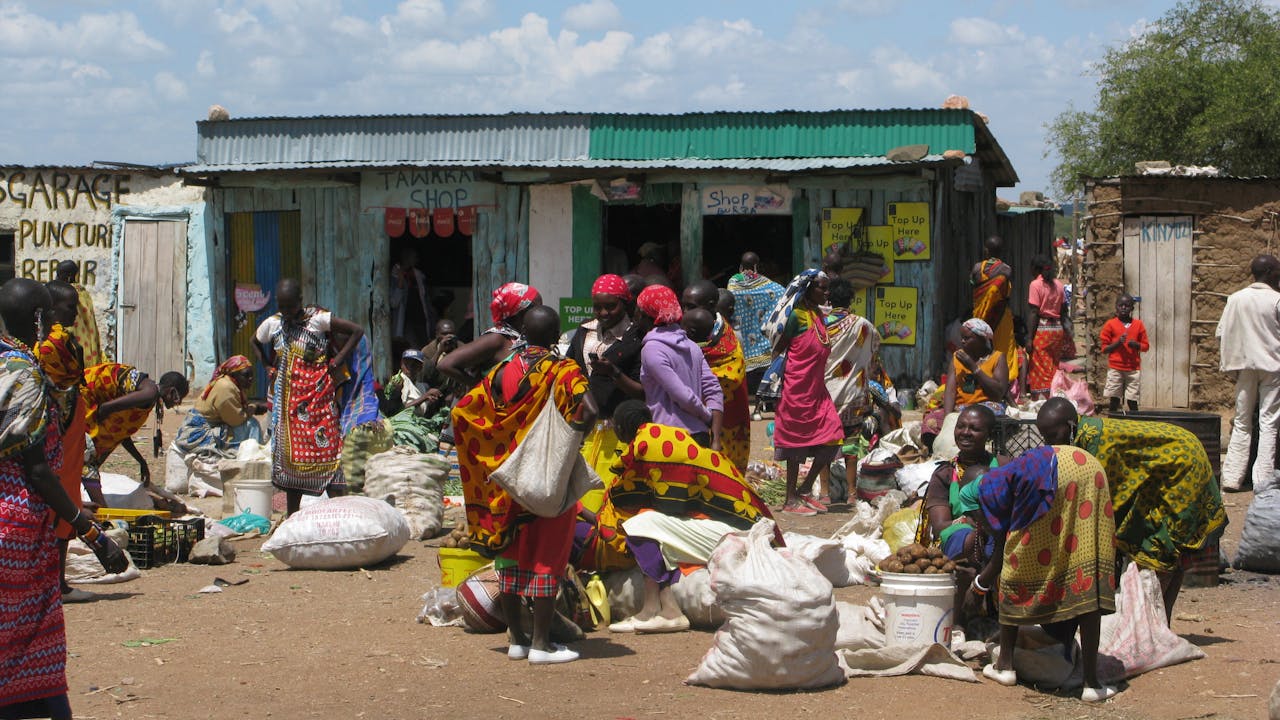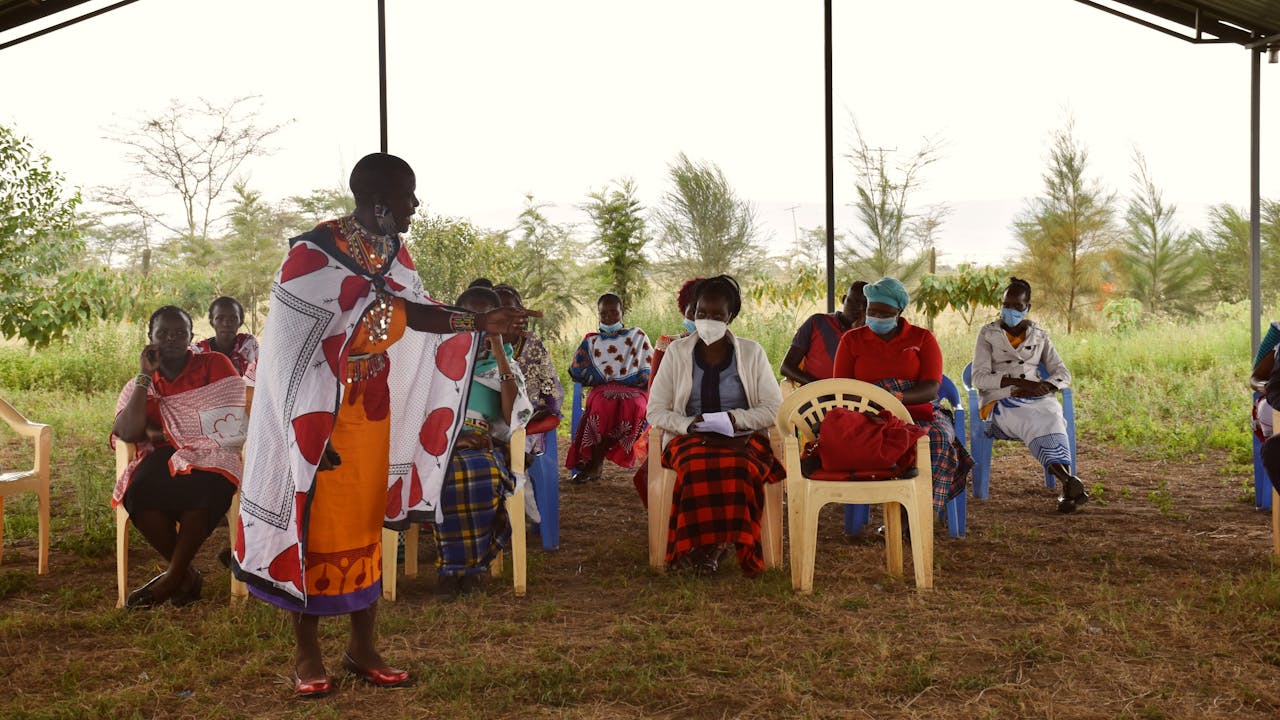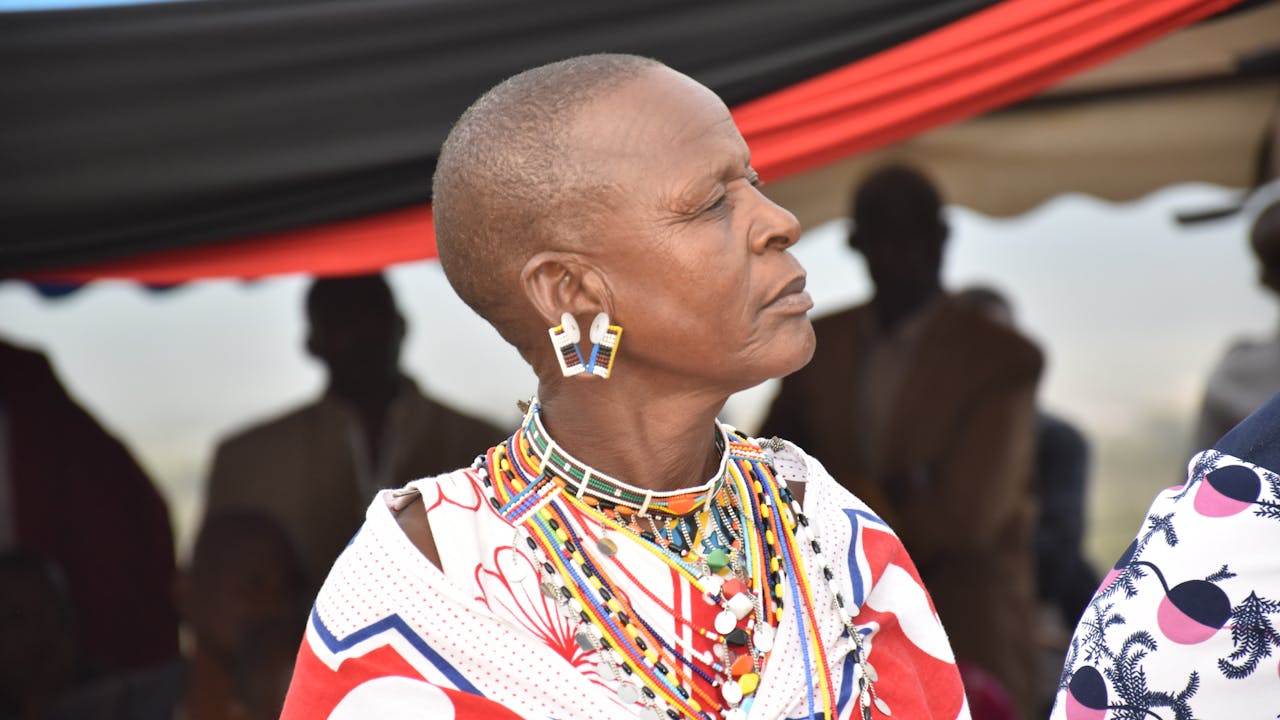Every opportunity I get, I speak on behalf of women in the Maasai community. We want women not to sleep but to wake up. Even those with pierced ears like me, our minds haven’t been pierced, we have the brains to advance forward!
My name is Mary Nkisonkoi. I am a facilitator and come from the Maasai village of Oloshaiki in the Great Rift Valley in Kenya.
I was lucky enough to have been chosen as a facilitator for a community project in my area.
Before this project started, women in our region didn’t get together and talk candidly about their problems and challenges. We weren’t allowed to unless our husbands knew what had been said.
We just used to stay in the village and meet in church. After the service everyone would go their way and continue with their family responsibilities. We didn’t know that as mothers we could do something that could help us as a community or as women.
Then this project came and started teaching us about gender, about women’s rights, the difference between a wife and a husband. This encouraged us and gave us the motivation to speak to our men.
I was trained as a facilitator to bring men and women into the public forums. I call the village elder, women, leaders of community groups to discuss what is needed to improve our region.
The first change to happen, which we are proud of, is that women were able to get adult education. We were taught by a teacher from the project. We were also taught how to run a business.
Many women joined the classes since we did not have other livelihoods. Traditionally, women cannot sell cows or maize because the farm belongs to the husband.
At first it was a challenge, but we learned to plan ahead and make sure our household chores and herding the goats and cows were done in the morning. At 2pm, once the children were back home from school, we would rush quickly to class.
Women learned the alphabet and numbers and as a result could use mobile phones.

Market day in a Maasai village. With our women’s group we helped women grow their businesses, including cultivating and selling vegetables at local markets.
© Henri Bergius/Flickr/CC BY-SA 2.0The adult education classes got us thinking about what else we could do. How were we going to maximise this opportunity we had to leave our homes? What other changes could we make?
We formed a women’s group, or Chama, and came up with what we called a “merry go round”, pooling our money to help each other.
Our market day here is on Wednesdays, where some women sell beans, potatoes or other vegetables. We decided to meet every Thursday after market day. Each woman would bring Ksh 50 (40 US cents) or Ksh 100 (81 US cents). Then if a woman needed to borrow some money to grow her business, we would lend her the money, and she would repay it plus interest. Then we would give it to the next woman to grow her business.
The other change in our lives as women is that our husbands learned to give us room and space. When I sat with them as a facilitator, I informed them that mothers can also bring an income to the family and pay for education or buy food.
Now we are free as women to run our own businesses. Each woman can bring in something into their homes and put it on the table, however little. Even Ksh 500 (USD 4.10). We tell our husbands, “This is how much I was able to get.” So, this is a big change. We are not living the way we used to before.
I told myself: in my business I am going to be one of the shining stars in this region.

When I began the training, I started to grow mentally. I told myself: in my business I am going to be one of the shining stars in this region.
Men are usually the ones who conduct the livestock business. We talked at home, and I was granted permission when I said I wanted to start a business. I had some savings that I had made from cultivating. I planted one hectare. From this one hectare I was lucky, I made Ksh 20,000 (USD 163).
I used this money to buy a calf. My plan was that this calf would then reproduce and give me a bull or a cow. Then I would sell the first one to get money back.
Another aim was to build a permanent house, not a mud house. I wanted changes. I started selling my cows and opened an account.
Our women’s group went to a bank called K Unity. We started putting in savings. After 6 weeks, we took a loan. I took Ksh 50,000 (USD 408). Others did the same and ran maize businesses. I bought a cow and a mattress.
With my facilitator job we are given a transport allowance. I saved the extra that remained after the transport fee.
Now I have a house under construction, which my children are helping me to build. I was able to buy the iron sheets for the roofing with my own savings of Ksh 200,000 (USD 1,633).
I have been successful in business because I was able to broaden my mind and get big ideas. I am still progressing.

Now as a facilitator of Oloshaiki, I have had the opportunity to get close to the men and women in the community. We have come to know each other better and can talk openly.
© Geofrey Rono, ILO/OITIn this region I am now the chairperson of all the women’s groups. I am also in charge of women’s welfare in my village. I have taken to leadership very well. When we go to public forums, people ask: “Where is Mary Nkisonkoi?”
The women of this region have changed. We recently started building and upgrading our family homes. In the old Maasai days, people went behind bushes when nature called. Through our efforts, we have been educating others on the importance of installing toilets.
As part of the project, we also had an opportunity to plant trees. I planted the 50 seedlings I received around my house to make a living fence. I fetched water and watered my tree seedlings, and they are growing successfully. They will provide shade and we hope in the coming years the trees will have a positive impact on the local climate.

I have had a great opportunity to help empower women in my community and across my region.
© Moses Sanita/ ForumCivStep by step we are seeing progress. Recently, along with other facilitators, we talked to the MP and local councillor and told them we wanted roads and local health facilities. They promised us that we would get roads, and we now have a medical dispensary. The governor heard our cries.
In the town of Suswa we participated at a meeting that was about national budgeting. We said we had problems with access to water and a hospital. They said they would deal with those issues. Now we know those issues will be addressed because we know how to follow up on our rights.
I urge women to take up leadership positions and fight for their rights in Kenya!

Women are not people to be oppressed. Once a woman is educated and can do her thing, the community is going to benefit more than if the husbands were to do the same. This is because women are at the heart of families and do much of the raising of the children. So, I urge women to wake up and take up leadership positions and fight for their rights in Kenya!
